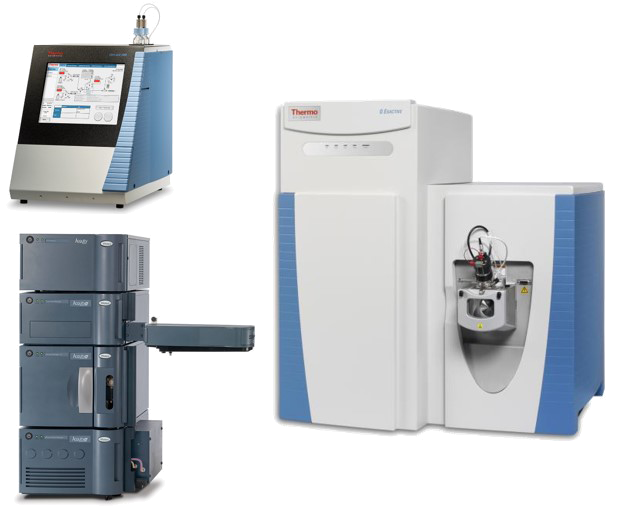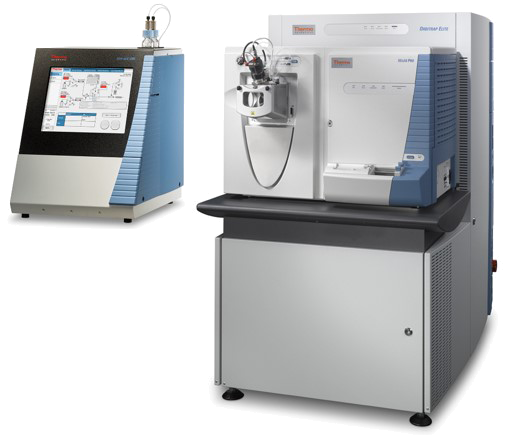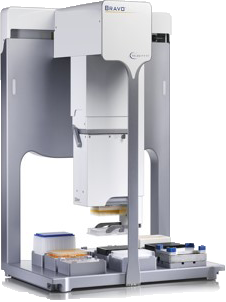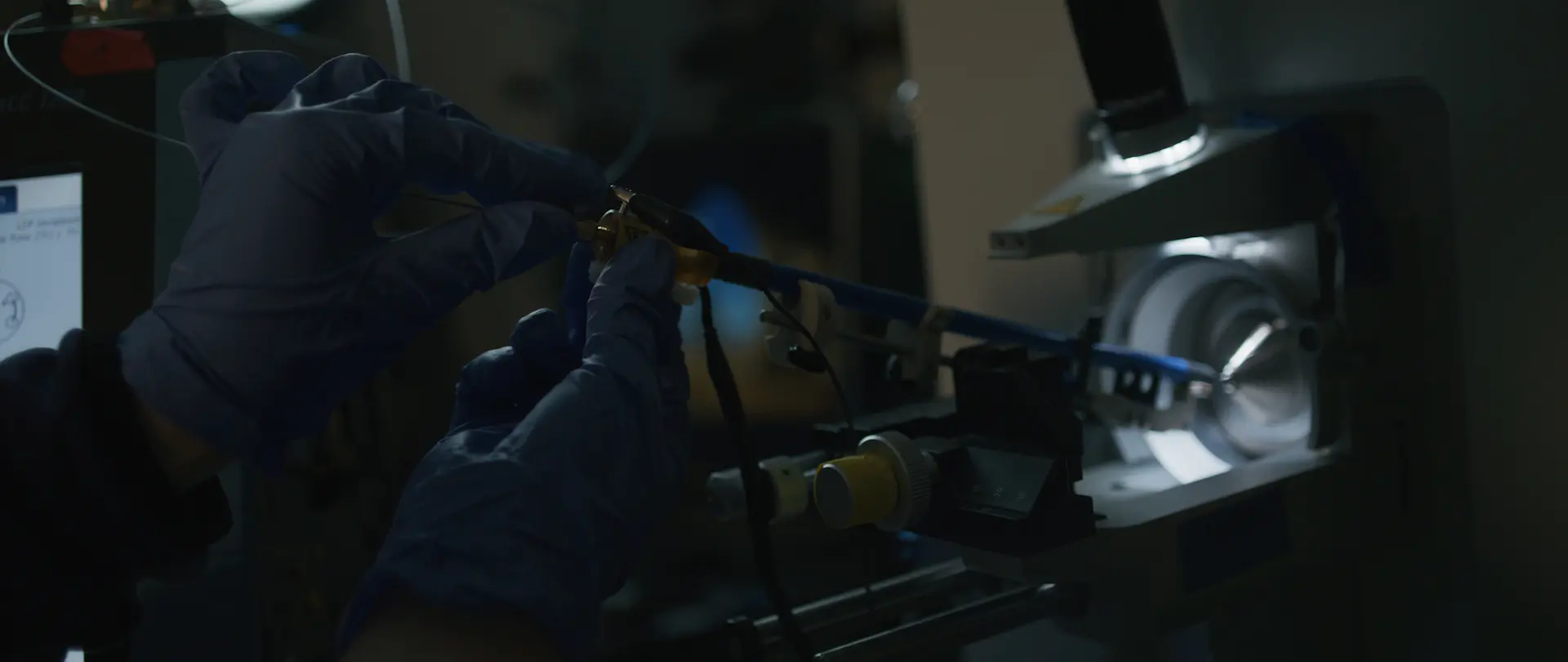Overview
The Sanford Burnham Prebys Proteomics Shared Resource provides state-of-the-art mass spectrometry-based proteomics services including identification, quantification and characterization of proteins and their post-translational modifications. We provide proteomics services to Institute scientists as well as outside non-profit and for-profits organization on a fee-for-service basis.
The Proteomics Shared Resources is located on the main campus and currently houses three mass spectrometry platforms. The facility is run by four highly committed proteomics experts, including one faculty member as scientific advisor.
Equipment Highlight
Seer Bio Proteograph SP100
The platform combined with TMT multiplexing has the capability to detect ~2500 protein groups in plasma samples, including low abundant proteins like cytokines.
Services
The Proteomics Shared Resource Offers a Diverse Array of Mass Spectrometry Services Including:
- Identification and Localization of Post-Translational Modifications (e.g., phosphorylation, ubiquitinylation, acetylation, methylation, nitrosylation)
- Quantitative comparison of protein abundances in complex mixtures using label-free or label-based techniques (e.g., SILAC, TMT)
- Targeted protein identification and quantification
- Protein/Peptide Identification
- Identification of protein-protein interactions by Affinity Purification followed by Mass Spectrometry (APMS) analysis
- Identification of biotinylated proteins
- Comprehensive serum proteomic profiling
We urge you to consult with us prior to starting your proteomics experiment. We will help you to design the best experiment that fits your purposes.
Equipment & Resources
The Proteomics Shared Resource is equipped with 5 mass-spectrometry platforms, one automated liquid handling system for sample preparation and a robust computational infrastructure and software. Our mass spectrometers are coupled to either one- or two-dimension ultra-high performance nanoflow HPLC system (EASY nLC 1200, and 2D NanoAcquity).

Seer Proteograph XT
The Seer Proteograph XT is an advanced nanoparticle-based platform designed for deep, unbiased proteomics at scale. It enables high-throughput protein profiling with enhanced coverage, sensitivity, and reproducibility, making it a powerful tool for biomarker discovery and translational research. The platform enables the identification of over 3,000 proteins in human plasma, significantly expanding coverage compared to traditional mass spectrometry-based approaches.

Orbitrap Fusion Lumos
The Thermo Scientific Orbitrap Fusion Lumos Tribrid is the newest state-of-the-art mass spectrometer that allows system biologists to test the limits of proteome analysis. It incorporates the brightest ion source, a segmented quadrupole mass filter with improved selectivity and ion transmission, Advanced Vacuum Technology for improved ion transmission to the Orbitrap mass analyzer. These hardware improvements enable the new Tribrid instrument to excel in the most challenging applications, including analysis of low level proteins and PTMs, multiplexed relative quantitation using isobaric tags such as iTRAQ or TMT, and intact protein characterization. The Lumos is the most sensitive and versatile mass spectrometer currently available for proteomics work, and can do CID, HCD, and ETD fragmentation. Our two Lumos units are coupled to EASY 1200 UPLC system.

QExactive Plus
The QExactive Plus (QE+) is a highly sensitive, accurate mass instrument that uses an Orbitrap detector and HCD fragmentation. Our QE+ can be coupled to either a 2D M-Class NanoAcquity or an EASY 1200 UPLC system. With a fast scan speed and multiplexing capabilities, the QE+ is an outstanding system for mid-to-high complex proteomes. In addition, the QE+ also excels at targeted quantitation experiments, using the Product Reaction Monitoring (PRM) acquisition. In particular, we have developed an intelligent PRM approach which improves detection sensitivity at least 10x compared to conventional PRM method.

Orbitrap Elite
The Orbitrap Elite is a hybrid instrument consisting of an LTQ Velos Pro linear ion-trap coupled to a high-field Orbitrap detector. This allows high-mass accuracy scans to be acquired in the Orbitrap, and rapid sensitive scans to be acquired in the LTQ. The instrument can perform CID, HCD and ETD fragmentation. The high-field Orbitrap mass analyzer geometry and advanced signal processing technologies enable resolution of >240,000, superior spectral quality, and higher scan speed. The outstanding resolution increases analytical certainty by improving molecular weight determination for intact proteins and clearly resolving smaller, isobaric species. Our Orbitrap Elite is coupled to a EASY 1200 UPLC, and is generally used for low-to-mid complex proteomes.

Agilent AssayMap BRAVO Platform
For automated sample preparation
Price List
For a complete list of services, please call (858) 646-1000 ext. 4180 or email us.
| Prod ID | Proteomics Service | Internal Subsidized | Internal | External Non-Profit | External For-Profit | |
|---|---|---|---|---|---|---|
| K800 | Total proteome profiling | TMT 6plex | $2,000 | $2,500 | $2,700 | $5,260 |
| K801 | TMT 10plex | $2,600 | $3,250 | $3,510 | $6,838 | |
| K802 | TMT 16plex | $3,700 | $4,625 | $4,995 | $9,731 | |
| K015 | TMT 18plex | $4,234 | $5,292.50 | $5,715.90 | $11,135.42 | |
| K803 | Phospho+Total proteome profiling | TMT 6plex | $3,100 | $3,875 | $4,185 | $8,153 |
| K804 | TMT 10plex | $3,600 | $4,500 | $4,860 | $9,468 | |
| K805 | TMT 16plex | $4,943 | $6,178.75 | $6,673.05 | $13,000.09 | |
| K016 | TMT 18plex | $5,560.88 | $6,951.09 | $7,507.18 | $14,625.10 | |
| K807 | Total proteome profiling | LFQ | $300 | $375 | $405 | $789 |
| K808 | Total GoBig proteome profiling | LFQ 6+ | $267 | $333.75 | $360.45 | $702.21 |
| K809 | Phospho+Total proteome profiling | LFQ 1x | $500 | $625 | $675 | $1,315 |
| K704 | Biotin AP-MS package | BioID | $330 | $412.50 | $445.50 | $867.90 |
| K705 | Biotin GoBig AP-MS package | 16+ BioID | $300 | $375 | $405 | $789 |
| K810 | On-bead’ AP-MS package | 1-5 samples | $250 | $312 | $337.50 | $657.50 |
| K811 | 6+ samples | $220 | $275 | $297 | $578.60 | |
| K812 | LC-MS/MS QE | 1-7 samples | $170 | $212.50 | $229.50 | $447.10 |
| K813 | 8+ samples | $150 | $187.50 | $202.50 | $394.50 | |
| K814 | LC-MS/MS Lumos | 1-7 samples | $250 | $312.50 | $337.50 | $657.50 |
| K815 | 8+ samples | $220 | $275 | $297 | $578.60 | |
Leadership
Elena Pasquale, PhD
Scientific Director
Weiliang Huang, PhD
Facility Associate Director
whuang@sbpdiscovery.org
Contact
Weiliang Huang, PhD
Main Responsibilities: Global proteomics analysis using label-free or isobaric labeling techniques, post-translational modification (PTM) analysis including phosphoproteomic analysis, biotinylated protein enrichment and identification, interactomics. Quantitative proteomics analysis and computational analysis of large-scale proteomics data using MaxQuant, Spectronaut, Spectromine, Proteome Discoverer. Facility billing/budgeting, Sample queue and general proteomics inquiries.
Please call (858) 646-3100 ext. 4180 or use the button below to send us an email.
